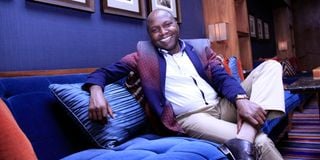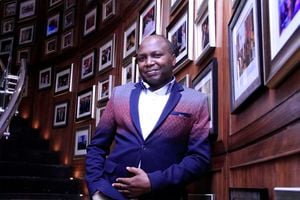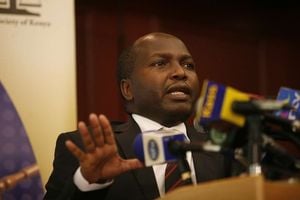
Lawyer Donald Kipkorir at the Capital Club, Nairobi on August 5, 2016.
A court battle between city lawyer Donald Kipkorir and prestigious Muthaiga Country Club has exposed how the stringent rules at the exclusive clubs might lead to potential suits and in some instances risks of compensation to the aggrieved party.
Other than Muthaiga Country Club, a number of clubs have been taken to court by patrons and in some instances, the members successfully quashed the decisions to expel them.
Other members, though, have been unlucky as courts upheld their expulsion or temporary suspension from the clubs.
The legal fight between Mr Kipkorir and Muthaiga Country Club has attracted interest, especially because the lawyer is not a member and has stated that he has not applied to join the club. However, he has indicated it is wrong for him to be denied access to the premises whenever he is invited by his clients, who are members of the club.
The lawyer scored a temporary win after High Court judge Chacha Mwita directed Muthaiga Country Club to allow him access, pending the determination of the case.
Mr Kipkorir said he had been denied entry to the club on two occasions, a move that impeded his work as an advocate and in violation of his constitutional rights.
The lawyer said in the course of his duty as an advocate, he often meets clients outside his chambers to take instructions and the club is one such place.
He said he was invited by one of his clients, who is a member of the Club on August 9, 2024 to take instructions in a matter, but he was denied entry with no cogent explanation, when he asked for reasons for the decision.
Mr Kipkorir said the August 9 incident was a continuation of another one that allegedly occurred in October 2022 where he was allowed entry after complaining.
He said he asked to leave while being treated “like a stray dog, a homeless hound that had crushed the hallowed grounds of the privileged elite”.
Mr Kipkorir said he had been attending meetings at the club for more than 20 years unhindered and without any fetters at all, before the two incidents.
“Kenya is not a patriarchal patrimonial state, a monarchy, a military state, an apartheid state, a cast state, or a colonial state that governance supports the organic segmentation and discrimination of its citizens as public policy mantra,” he said in the petition.
In a separate case, the club in July this year won a case filed by Mr Stephen Mbugua Mwagiru, who was expelled in 2012.
The tycoon failed to overturn his expulsion after High Court Judge Arsenath Ongeri dismissed his case saying Muthaiga Country Club suspended him in accordance with its memorandums and articles of association.
The tycoon was accused that on April 25, 2012, he abused and threatened an employee of the club and a day later, while in the company of several women, he allegedly visited the Club's Pink's Bar at around 12 am and ordered food, yet the kitchen had been closed.
The court heard that he hurled obscenities at the employees and, in a most indecent manner totally unbecoming of a member of the club, he urinated in the restaurant's corridor claiming that the toilets were "too far".
Later the same year, he allegedly visited Pink's Bar, generally reserved for young adults, to partake of alcoholic drinks. After appearing to be intoxicated, Mr Mwagiru allegedly proceeded to abuse staff with obscenities.
The judge added that the tycoon was given a chance to appeal to the general meeting but he squandered the chance, although he at some point apologised for the behaviour.
According to the court, had Mr Mwagiru proved his case, he would have gotten an award of Sh2 million.
The tycoon was then invited to disciplinary proceedings before he was suspended but he challenged the decision on October 31, 2012 saying it was illegal. He eventually lost the case.
Meanwhile, in 2014 a bench of three judges of the High Court set a new precedent after blocking members’ clubs from using discriminatory rules that limit participation along gender lines.
The Bench comprising judges Isaac Lenaola (now judge of the Supreme Court), Mumbi Ngugi (now Court of Appeal judge) and the late David Majanja ruled in favour of three female members of Limuru Country Club, who sued the club for using “unfavourable rules”.
The judges quashed the decision by the Club to suspend Rose Wangui Mambo and Caroline Wangari Ngugi, and rejected the argument by the officials that the rules that discriminate against women are widely in practice among private clubs.
“It cannot be safe, in a progressive democratic society, to arrive at a finding that allows private entities to hide behind the cloak of ‘privacy’ to escape constitutional accountability,” ruled the judges.
The two, alongside Martha Wanjiru Vincent, who later withdrew from the case after reaching an agreement with the club, moved to court alleging discrimination.
The dispute traces its genesis from a decision of the Board on December 22, 2012, when directors passed a resolution that declared the golf committee of the Limuru Country Club “a male-only affair.”
The resolution read: “The golf committee being a male-only affair, only full male members with valid handicaps, and who are fully paid up, will be allowed to participate in the meeting and that lady golfers will attend the meeting as guests.”
During this meeting, the golf captain and golf vice-captain were to be elected. These changes locked out women members from either voting or vying for the positions and the protests by the initial three did not help them to break the new glass ceiling but earned them a suspension.
But the judges declared that private clubs are not insulated from obligations to respect and uphold fundamental rights of individual members under the disguise of privacy.
“While we agree that private members clubs are discriminatory by their very nature in terms of whom they may or may not admit, and that, therefore, courts ought not to micromanage their internal operations, that does not absolve these entities from the constitutional burden of adherence to constitutional values and principles,” they added.
In a separate case, Mr Trishul Vijay Chohan, a member of Nyanza Club, successfully sued for his reinstatement to the club following his expulsion in December 2017.
He was accused of having an altercation with a waiter at the club.
The club said it received a written complaint from one of the waiters, claiming that he had refused to pay his bill after being served and had without provocation slapped and insulted the waiter.
After receiving the complaint, the club was of the opinion that he had breached section 7 (b) of the Club’s by-laws and was invited for a hearing.
Mr Chohan on his part maintained that he was expelled as a punishment for being vocal about failure by the waiters to issue official bills for services offered and complaints about loss of members’ money. He said his offence was non-existent.
He said he was expelled indefinitely without giving him a hearing, a decision that was extended to members of his family and was condemned unheard.
Justice Thripsisa Cherere, then sitting in Kisumu, quashed the decision and ordered the club to reinstate him.
“From the proceedings of the Disciplinary Committee on record, there is evidence to support the applicant’s allegations and hence this Court finds that the disciplinary process adopted by the Respondents failed to meet the threshold of a fair administrative action,” the judge said in a judgment on March 15, 2018.
In 2021, Mr Wilfred Achilla sued Mombasa Golf Club after he was expelled a year before but he was unsuccessful in his bid to quash the decision.
High Court judge Eric Ogola said he had himself to blame after failing to appear for the disciplinary hearing.
Evidence tabled in court showed that on November 14, 2020 while at the club, he exhibited unruly behaviour by forcing his way into the counter beyond sale hours and even insulted the board of directors, club members and the staff by uttering profane insults which amounted to gross misconduct.
The club said a member is supposed to depict high levels of self-discipline and respect.
He was invited for the hearing but wrote back to the club requesting for the rescheduling of the disciplinary hearing, saying he was out of town.
The board considered his letter and resolved that the reason was not satisfactory and carried on with the hearing.
He challenged his expulsion saying the resolution was contrary to the clear provisions of Article 20(3) of the Memorandum of Articles of Association of the club.
Mr Achilla said the communication was misleading, malicious and calculated to injure and destroy his reputation.
In the ruling on September 30, 2021, Justice Ogola said by failing to appear for the hearing, Mr Achilla was not only the author of his misfortune, but also that he actively participated to aggravate the situation by failing to attend the hearing.
“In this regard I note that the Ex-parte Applicant (Mr Achilla) himself did not appreciate the process, and indeed with impunity, distanced himself from the process by refusing to attend the disciplinary proceedings. He accordingly, has himself to blame,” said the judge while dismissing the case.
In yet another case, Mr Daniel Mutisya Kivuva similarly lost a petition seeking to quash a three-month suspension imposed on him by the Machakos Golf Club in October 2019.
Mr Kivuva was handed the suspension for allegedly insulting one of the members of the club but he said the move was made because he happened to be a supporter of Wiper Party.
He said other than interfering with his enjoyment of the club services, Mr Kivuva submitted that he was never given a fair hearing.
But High Court judge David Kemei dismissed his claim saying he was given an opportunity to be heard.
“I conclude that the club complied with the requirements of the Articles of Association and the by-laws that govern the petitioner when it handled the disciplinary matter,” said the judge.







